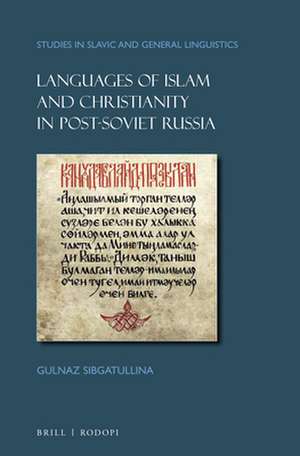Languages of Islam and Christianity in Post-Soviet Russia: Studies in Slavic and General Linguistics, cartea 46
Autor Gulnaz Sibgatullinaen Limba Engleză Hardback – 10 iun 2020
Mapping linguistic strategies of missionaries, converts and religious authorities, Sibgatullina demonstrates how sacred vocabulary in each of the languages is being contested by a variety of social actors, often with competing agendas. These linguistic collisions not only affect meanings of the religious lexicon in Tatar and Russian but also drive a gradual convergence of Russia's Islam and Christianity.
Preț: 639.26 lei
Preț vechi: 779.58 lei
-18% Nou
Puncte Express: 959
Preț estimativ în valută:
122.34€ • 126.38$ • 101.82£
122.34€ • 126.38$ • 101.82£
Carte indisponibilă temporar
Doresc să fiu notificat când acest titlu va fi disponibil:
Se trimite...
Preluare comenzi: 021 569.72.76
Specificații
ISBN-13: 9789004426443
ISBN-10: 9004426442
Dimensiuni: 155 x 235 mm
Greutate: 0.7 kg
Editura: Brill
Colecția Brill
Seria Studies in Slavic and General Linguistics
ISBN-10: 9004426442
Dimensiuni: 155 x 235 mm
Greutate: 0.7 kg
Editura: Brill
Colecția Brill
Seria Studies in Slavic and General Linguistics
Cuprins
Contents
Acknowledgements
List of Tables and Figures
Abbreviations
Notes on Translation and Transliteration
1 Introduction
1.1 Earlier Work on the Religious Language and Some Gaps in the Research on the Sociology of Language and Religion
1.2 Languages across Faith Communities
1.3 Research Questions
1.4 Defining Religious Language
1.5 The Structure of This Book
1.6 Outline of Chapters
2 Mapping the Discourse on Religion in Russia
2.1 Official Religious Institutions Vis-à-Vis the State
2.2 The Many Faces of Russia’s Orthodox Christianity
2.3 Competing Definitions of the Tatar Islam
2.4 Conclusion The Russian Language of Islam
3 Translating Islam into the Language of the Russian State and the ROC
3.1 Data and Method
3.2 Lexical Aspects
3.3 Textual Structures
3.4 Conclusion
4 Discursive Strategies in Conversion Narratives of Russian Muslims
4.1 Conversion to Islam in the Post-Soviet Period
4.2 Discursive Strategies in Conversion Narratives
4.3 Conclusion
5 Envisioning a Russian(-Speaking) Umma
5.1 Ali Viacheslav Polosin: Biography and Conversion
5.2 Islam as a Liberal State Ideology (2000-2006)
5.3 The Path of Moderation (2007-2015)
5.4 Defining the “Right” Muslims (2016-Present)
5.5 Conclusion The Tatar Language of Christianity
6 Daniil Sysoev: Mission and Martyrdom
6.1 The Making of a Saint
6.2 Uranopolitism versus Patriotism
6.3 Evangelism among Muslims
6.4 Conclusion
7 From Religious to Ethnic Minority: Discourses on Kräshens
7.1 Constructing the Other: Imperial and Soviet Policies
7.2 Kräshen Ethnic Identity in the Post-Soviet Period
7.3 Alternative Christianity
7.4 Conclusion
8 Battle of the Books: Tatar Translations of the New Testament
8.1 Translation Projects
8.2 Translation Strategies
8.3 Non-Orthodox Christian Communities Using Tatar
8.4 Conclusion
9 Conclusions
9.1 Convergence in the “Traditionalism” Box
9.2 Language as a Mirror
9.3 Toward a Painful Merger
9.4 Language, Religion and Translation: Negotiating the Difference
Bibliography
Index
Acknowledgements
List of Tables and Figures
Abbreviations
Notes on Translation and Transliteration
1 Introduction
1.1 Earlier Work on the Religious Language and Some Gaps in the Research on the Sociology of Language and Religion
1.2 Languages across Faith Communities
1.3 Research Questions
1.4 Defining Religious Language
1.5 The Structure of This Book
1.6 Outline of Chapters
2 Mapping the Discourse on Religion in Russia
2.1 Official Religious Institutions Vis-à-Vis the State
2.2 The Many Faces of Russia’s Orthodox Christianity
2.3 Competing Definitions of the Tatar Islam
2.4 Conclusion The Russian Language of Islam
3 Translating Islam into the Language of the Russian State and the ROC
3.1 Data and Method
3.2 Lexical Aspects
3.3 Textual Structures
3.4 Conclusion
4 Discursive Strategies in Conversion Narratives of Russian Muslims
4.1 Conversion to Islam in the Post-Soviet Period
4.2 Discursive Strategies in Conversion Narratives
4.3 Conclusion
5 Envisioning a Russian(-Speaking) Umma
5.1 Ali Viacheslav Polosin: Biography and Conversion
5.2 Islam as a Liberal State Ideology (2000-2006)
5.3 The Path of Moderation (2007-2015)
5.4 Defining the “Right” Muslims (2016-Present)
5.5 Conclusion The Tatar Language of Christianity
6 Daniil Sysoev: Mission and Martyrdom
6.1 The Making of a Saint
6.2 Uranopolitism versus Patriotism
6.3 Evangelism among Muslims
6.4 Conclusion
7 From Religious to Ethnic Minority: Discourses on Kräshens
7.1 Constructing the Other: Imperial and Soviet Policies
7.2 Kräshen Ethnic Identity in the Post-Soviet Period
7.3 Alternative Christianity
7.4 Conclusion
8 Battle of the Books: Tatar Translations of the New Testament
8.1 Translation Projects
8.2 Translation Strategies
8.3 Non-Orthodox Christian Communities Using Tatar
8.4 Conclusion
9 Conclusions
9.1 Convergence in the “Traditionalism” Box
9.2 Language as a Mirror
9.3 Toward a Painful Merger
9.4 Language, Religion and Translation: Negotiating the Difference
Bibliography
Index
Notă biografică
Gulnaz Sibgatullina, Ph.D. (2019), Leiden University, is a postdoctoral fellow at the University of Amsterdam in the Netherlands. The main themes of her work have been Muslim-Christian relations in Russia, religious conversion as well as translation politics.











